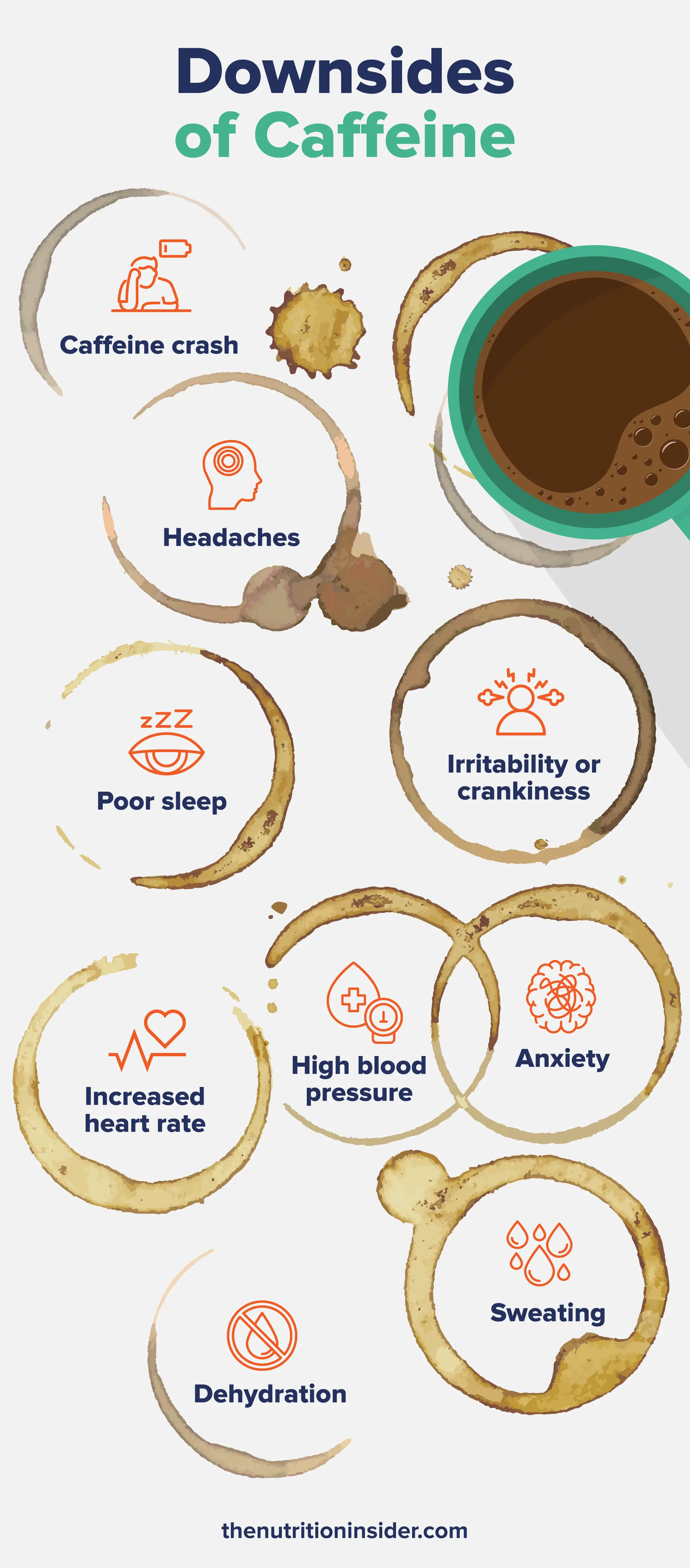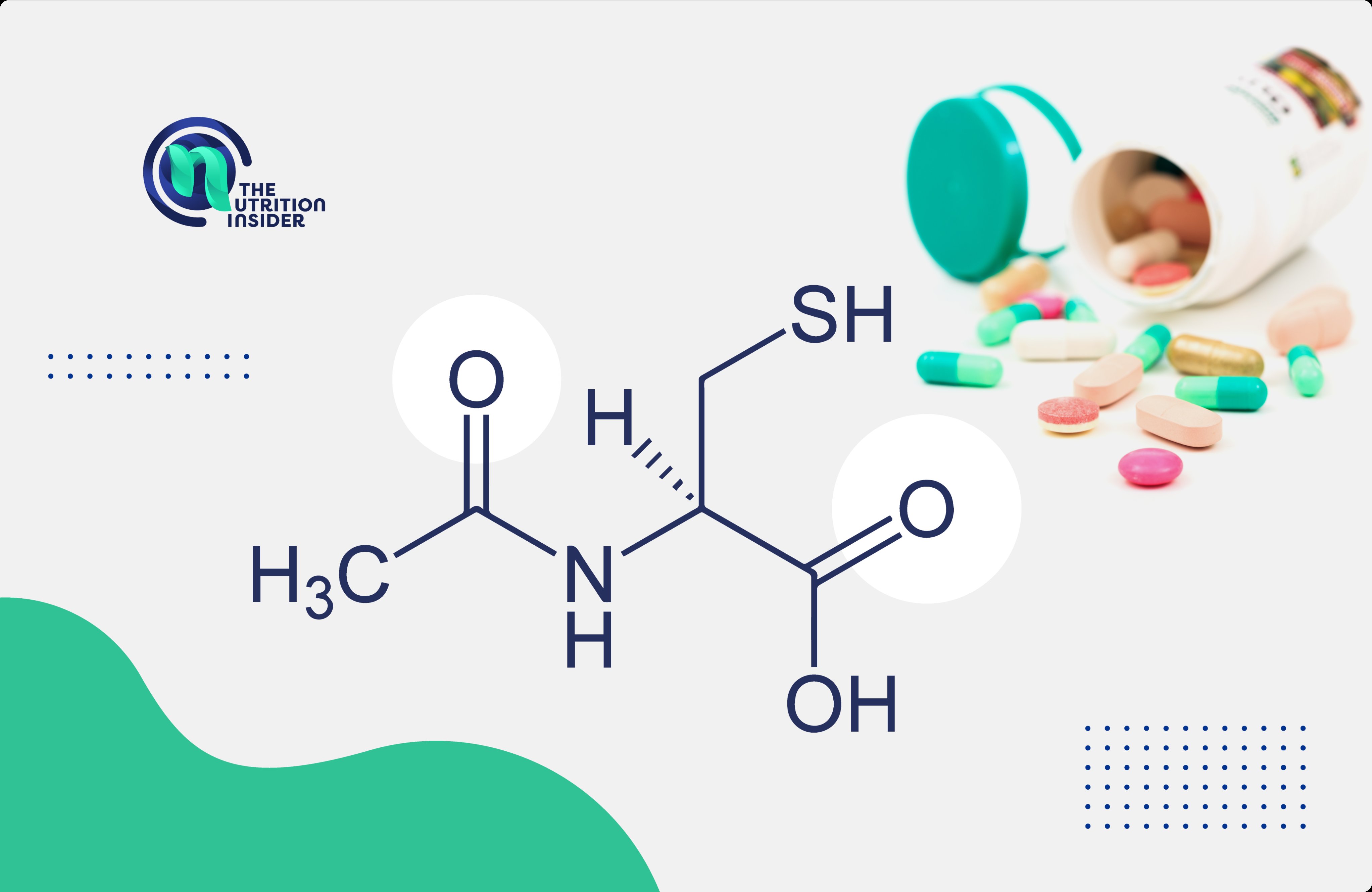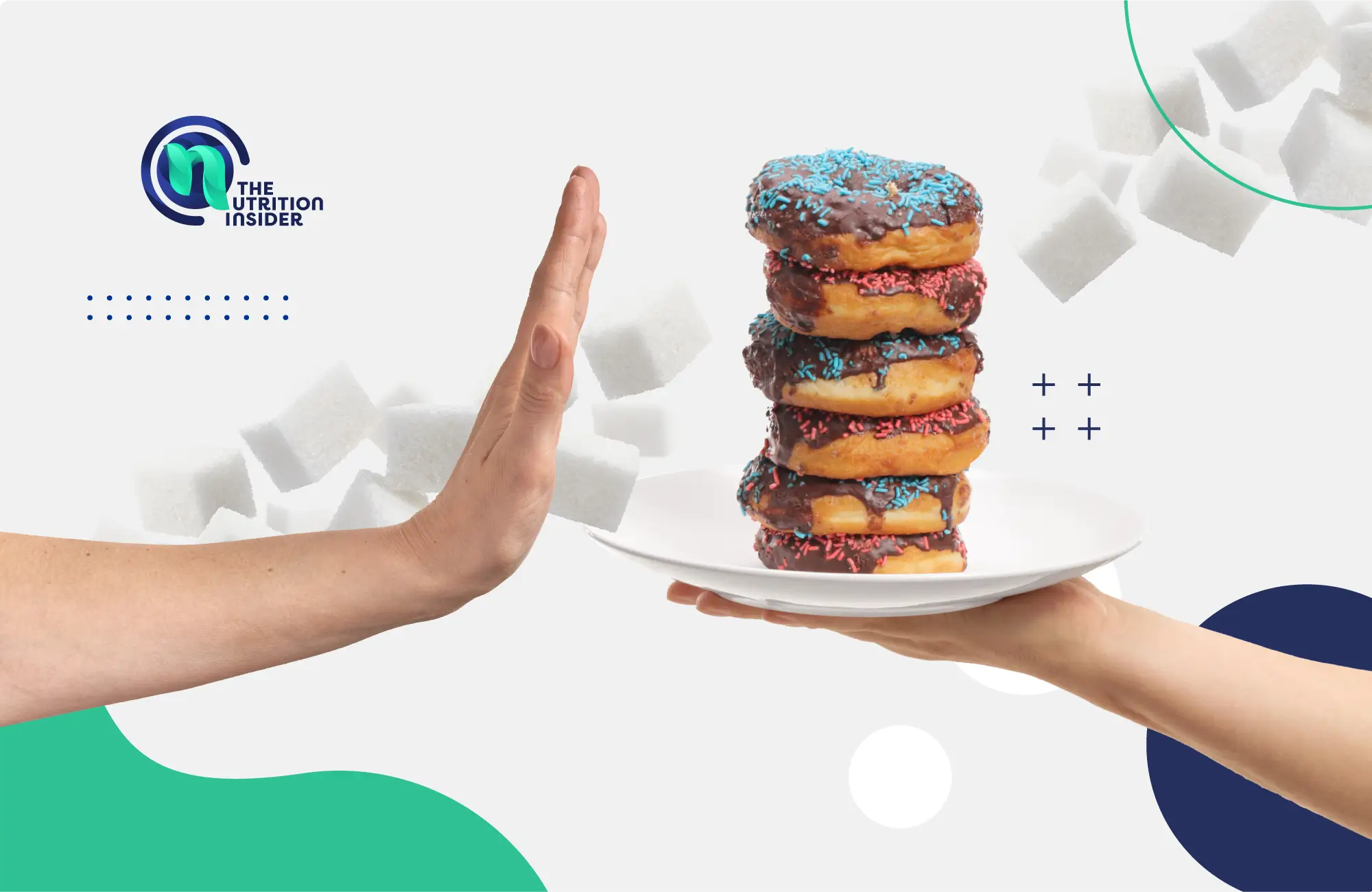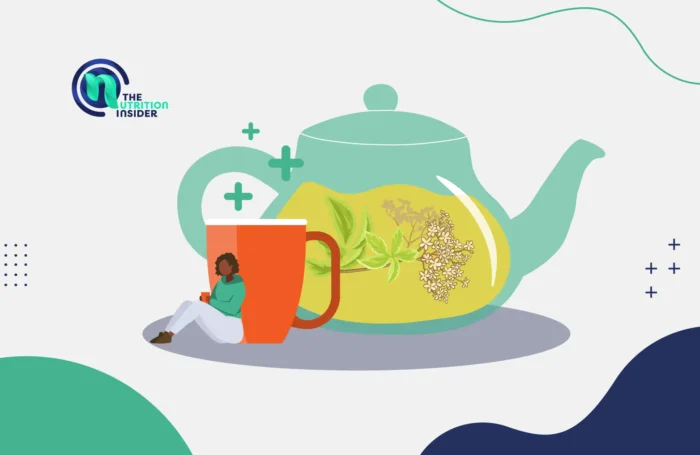This post contains links through which we may earn a small commission should you make a purchase from a brand. This in no way affects our ability to objectively critique the products and brands we review.
Health Benefits of Caffeine
Evidence Based Research To fulfill our commitment to bringing our audience accurate and insightful content, our expert writers and medical reviewers rely on carefully curated research.
Read Our Editorial Policy
From coffee and Coca-Cola to energy drinks and espresso, it’s estimated that 80% of the world’s population consumes caffeine on a given day.1
While coffee and tea are probably the most popular caffeine-containing drinks—and the ones with the most antioxidants and nutrients—caffeine itself has also been shown to provide several health benefits.
However, caffeine also has some pretty significant downsides—especially if you overconsume it.
In this article, we’ll explore caffeine’s potential health benefits and negatives, including how much is a healthy amount to consume.
Is Caffeine Good For You? Potential Health Benefits
Caffeine is the most commonly used psychoactive substance (aka drug) in the world, with more than 60 plant species naturally producing it, including coffee (Coffea arabica), tea (Camellia sinensis), cocoa (Theobroma cacao), and yerba mate (Ilex paraguariensis).
It’s also artificially produced, which is the type often added to energy drinks, caffeinated chewing gum, or soda.
While caffeine has several evidence-backed benefits, keep in mind the form you consume. An energy drink or soda with 50 grams of sugar will likely negate most of the positive effects (other than increased energy) seen in the research.
The same goes for ultra-sweet coffee drinks or tea. To maximize the health benefits, aim for unsweetened or less-sweetened versions of natural caffeine-containing plants, like coffee, black tea, green tea, cocoa, or yerba mate.
1. Increases Energy
As most people inherently know (why else would we drink it?), caffeine increases energy and is considered a stimulant.
This is hardly a new phenomenon, as researchers date this observation back to the 9th century when an Ethiopian shepherd reportedly noticed his goats snacking on wild coffee berries (how they grow before they are roasted into coffee beans) and becoming subsequently hyper.2
Caffeine increases energy by blocking the action of adenosine, a neurotransmitter that slows down nerve cell activity and causes drowsiness. After drinking or consuming caffeine, it will appear in the bloodstream about 30 to 60 minutes later.3
When this occurs, caffeine binds to adenosine receptors because it has a very similar chemical structure to adenosine. Therefore, adenosine cannot bind to its receptors, so you feel alert rather than sleepy.
This energizing effect can benefit people who need to stay up late for work, work night shifts or varying schedules, or simply need an extra jolt in the morning. However, most people can build caffeine tolerances, meaning they need more and more to get the same boost of energy.
2. Improves Mood
Caffeine consumption—especially drinking coffee—is linked to improvements in mood disorders, including depression.4
In a meta-analysis including data from almost 347,000 people, researchers concluded that people with higher coffee intake had a 24% reduced risk of developing depression compared to those with the lowest consumption.4
The peak protective benefit was found to be 400mL (13.5oz) of coffee per day, as excessive intake also harmed mood. When analyzing a subset of the studies, caffeine itself also had a slight beneficial effect on depression.4
Caffeine may also improve mood acutely (like right after drinking it), but it can quickly turn into increased anxiety and agitation if too much is consumed. Again, the dose makes the poison, and most people have a caffeine threshold that they cannot go over without experiencing negative side effects.
3. Improves Cognitive Health
In the short term, caffeine can boost mental clarity and alertness—especially if you’re sleep-deprived. Over time, studies have shown that caffeine (especially drinking coffee and tea) improves several aspects of cognitive function and brain health.5
In research with sleep-deprived young males, caffeine consumption reversed declines in cognitive performance, alertness, and mood from not sleeping, including reaction time, addition/subtraction tasks, and logical reasoning.5
A review paper concluded that most studies show a protective effect of coffee on cognitive decline, dementia, or Alzheimer’s disease.6
One of these studies found that drinking 3 to 5 cups of coffee (real 8oz cups, not huge mugs!) at midlife was associated with a lower risk of dementia or Alzheimer’s disease by 65% in later life.7
4. May Increase Metabolic Rate and Fat Burning
Research has shown that caffeine can increase metabolic rate, which could be beneficial for burning more calories or increasing fat oxidation (“fat burning”).
In an older study from 1995, researchers looked at thermogenesis—essentially burning calories—in obese and lean women after consuming caffeine. The lean and obese women who consumed caffeine experienced increased thermogenesis at average rates of 7.6% and 4.9%, respectively. This increase in energy expenditure also led to significant increases in fat oxidation the next day in both groups.8
A similar study found that a single dose of 100mg of caffeine increased the resting metabolic rate of both lean and obese people by 3-4% over 150 minutes.9
Plus, repeated administration of 100mg of caffeine at 2-hour intervals over 12 hours increased energy expenditure by 8-11% throughout the day, correlating to an additional energy expenditure of 150 calories and 79 calories in lean and obese people, respectively.
In a 2019 meta-analysis of 13 randomized controlled trials, researchers concluded that caffeine intake promoted the reduction of body weight, fat, and BMI (Body Mass Index).10
Because metabolic rate is multifactorial and complex, future research is needed to pinpoint why caffeine affects lean and obese people differently.
Still, the research indicates that moderate caffeine consumption may boost metabolism to support weight loss, but it’s not seen in everyone.
5. Improves Athletic Performance
Caffeine is considered an “ergogenic aid,” meaning it enhances athletic performance. In fact, it’s the most popular ergogenic aid in sports, used by 75% of athletes before or during a competition.1
A small study from 2013 looked at the effects of caffeine, coffee, or decaf coffee on performance in trained male cyclists or triathletes. They found that the men consuming caffeine or coffee before a 45-minute cycling timed trial were significantly faster (by about 5% for both) and had more power compared to placebo and decaf groups.11
Another slightly larger study found similar results, showing that people who drank Turkish coffee completed a 5-kilometer race faster than when they drank decaffeinated coffee on a separate race day. They also had increased reaction time and respiratory exchange rate.12
Again, be sure not to overdo it on caffeine—you won’t get better results if you consume too much, and it will likely cause adverse and unwanted digestive effects!
6. May Reduce the Risk of Diabetes
Perhaps because of the link to increased metabolism, caffeine has been shown to lower blood sugar and reduce the risk of type 2 diabetes.
In a meta-analysis combining data from over 320,000 participants, researchers concluded that higher levels of caffeine consumption reduced the risk of type 2 diabetes by 30% compared to those that consumed the least caffeine. For every 200mg per day increase in caffeine consumption, the risk of type 2 diabetes was reduced by 14%.13
Keep in mind that if you are consuming Frappucinos, Pumpkin Spice Lattes, Dr. Peppers, or Monsters as your caffeine source, the excess sugar in them will not produce these same beneficial effects.
7. May Improve Liver Health
Coffee has been routinely linked to better liver health, likely because of its abundance of antioxidants. However, some research has shown that caffeine itself may also improve liver function.
In this study, both coffee and caffeine consumption reduced ALT (alanine aminotransferase) levels. This liver enzyme is often elevated in any stage of liver disease or injury (including fatty liver disease).14
Downsides of Caffeine
That said, there are many potential downsides of consuming caffeine—especially if you overdo it.
Overconsumption of caffeine can not only lead to a caffeine crash but potentially a caffeine overdose as well. The lethal dose of caffeine is 10 grams (10,000mg), but it can vary individually—and non-fatal negative side effects can occur at much lower doses.

Some potential downsides of caffeine (or drinking too much caffeine) include:
- Caffeine crash: Fatigue or drowsiness when the caffeine wears off, and adenosine floods the brain and binds to its receptors, causing sleepiness.
- Irritability or crankiness
- Headaches: Caffeine constricts blood vessels, including those in the brain. This narrowing of blood vessels slows down blood flow. Once the caffeine is out of your bloodstream, the blood vessels open up again, causing rapid changes in blood flow and pressure, leading to headaches.
- Poor sleep: Everyone is affected by caffeine differently, but most people cannot fall asleep or stay asleep if they have caffeine too close to bedtime. Even when caffeine is consumed six hours before bedtime, many people still experience reductions in overall sleep time or increased latency.15
- Anxiety: Feeling anxious or jittery can be caused by excess caffeine intake as well as a caffeine crash.
- High blood pressure
- Heart palpitations or increased heart rate
- Sweating
- Dehydration
How Much Caffeine Is In….?
Although the amount of caffeine can vary widely based on varietals or brewing techniques, there are some general caffeine ranges for commonly consumed beverages:
- Brewed coffee: 90-150mg per 8 ounces (This is one cup of coffee in a small cup—keep in mind that even a Starbucks “tall” is 12 ounces.)
- Espresso: 60-75mg per 1 ounce
- Energy drinks: 80-150mg per 8 ounces
- Black tea: 50mg per 8 ounces
- Green tea: 20-40mg per 8 ounces
- Caffeinated sodas: 25-30mg per 8 ounces
- Chocolate: 10-12mg per 1-ounce
Researchers recommend that healthy adults do not exceed 400mg of caffeine per day, but this is still too much for many people.16
Children, pregnant women, and lactating women are especially vulnerable to the side effects of caffeine intake. During pregnancy, caffeine intake recommendations are set at no more than 200mg per day, while lactating women should aim for less than 300mg per day.
Safe levels of caffeine for children have not been set, with recommendations varying from 0mg to 100mg per day for children over age 12.16
Caffeine FAQs
How much caffeine a day is beneficial?
Low to moderate doses of caffeine that benefit health are likely in the range of 100 to 400 milligrams daily, depending on the person and how well they metabolize caffeine.
What are the pros and cons of caffeine intake?
Pros of (moderate) caffeine intake include improved mood, alertness, cognitive health, metabolic rate, athletic performance, liver health, and blood sugar management. Downsides typically occur if you drink more than your body can handle, causing irritability, anxiety, jitters, high blood pressure, insomnia, heart palpitations, and sweating.
Is quitting caffeine worth it?
It depends! If you feel like caffeine is negatively affecting any aspect of your life, including sleep, mood, or stress, consider removing or cutting back on caffeine. You could start by making or ordering your coffee drinks as “half-caff” (half decaffeinated and half caffeinated coffee) or switching to a lower caffeine source, like tea. If you currently drink multiple cups of coffee per day, try swapping out some of them for tea or water.
What is the healthiest form of caffeine?
Coffee and tea are often considered the healthiest forms of caffeine because they have an abundance of antioxidants and bioactive compounds that benefit health.
- Samoggia, A., & Rezzaghi, T. (2021). The Consumption of Caffeine-Containing Products to Enhance Sports Performance: An Application of an Extended Model of the Theory of Planned Behavior. Nutrients, 13(2), 344. https://doi.org/10.3390/nu13020344
- Heckman, M. A., Weil, J., & Gonzalez de Mejia, E. (2010). Caffeine (1, 3, 7-trimethylxanthine) in foods: a comprehensive review on consumption, functionality, safety, and regulatory matters. Journal of food science, 75(3), R77–R87. https://doi.org/10.1111/j.1750-3841.2010.01561.x
- Urry, E., & Landolt, H. P. (2015). Adenosine, caffeine, and performance: from cognitive neuroscience of sleep to sleep pharmacogenetics. Current topics in behavioral neurosciences, 25, 331–366. https://doi.org/10.1007/7854_2014_274
- Grosso, G., Micek, A., Castellano, S., Pajak, A., & Galvano, F. (2016). Coffee, tea, caffeine and risk of depression: A systematic review and dose-response meta-analysis of observational studies. Molecular nutrition & food research, 60(1), 223–234. https://doi.org/10.1002/mnfr.201500620
- Institute of Medicine (US) Committee on Military Nutrition Research; Marriott BM, editor. Food Components to Enhance Performance: An Evaluation of Potential Performance-Enhancing Food Components for Operational Rations. Washington (DC): National Academies Press (US); 1994. 20, Effects of Caffeine on Cognitive Performance, Mood, and Alertness in Sleep-Deprived Humans. Available from: https://www.ncbi.nlm.nih.gov/books/NBK209050/
- Eskelinen MH, Kivipelto M. Caffeine as a protective factor in dementia and Alzheimer’s disease. J Alzheimers Dis. 2010;20 Suppl 1:S167-S174. doi:10.3233/JAD-2010-1404
- Eskelinen MH, Ngandu T, Tuomilehto J, Soininen H, Kivipelto M. Midlife coffee and tea drinking and the risk of late-life dementia: a population-based CAIDE study. J Alzheimers Dis. 2009;16(1):85-91. doi:10.3233/JAD-2009-0920
- Bracco, D., Ferrarra, J. M., Arnaud, M. J., Jéquier, E., & Schutz, Y. (1995). Effects of caffeine on energy metabolism, heart rate, and methylxanthine metabolism in lean and obese women. The American journal of physiology, 269(4 Pt 1), E671–E678. https://doi.org/10.1152/ajpendo.1995.269.4.E671
- Dulloo, A. G., Geissler, C. A., Horton, T., Collins, A., & Miller, D. S. (1989). Normal caffeine consumption: influence on thermogenesis and daily energy expenditure in lean and postobese human volunteers. The American journal of clinical nutrition, 49(1), 44–50. https://doi.org/10.1093/ajcn/49.1.44
- Tabrizi, R., Saneei, P., Lankarani, K. B., Akbari, M., Kolahdooz, F., Esmaillzadeh, A., Nadi-Ravandi, S., Mazoochi, M., & Asemi, Z. (2019). The effects of caffeine intake on weight loss: a systematic review and dos-response meta-analysis of randomized controlled trials. Critical reviews in food science and nutrition, 59(16), 2688–2696. https://doi.org/10.1080/10408398.2018.1507996
- Hodgson, A. B., Randell, R. K., & Jeukendrup, A. E. (2013). The metabolic and performance effects of caffeine compared to coffee during endurance exercise. PloS one, 8(4), e59561. https://doi.org/10.1371/journal.pone.0059561
- Church, D. D., Hoffman, J. R., LaMonica, M. B., Riffe, J. J., Hoffman, M. W., Baker, K. M., Varanoske, A. N., Wells, A. J., Fukuda, D. H., & Stout, J. R. (2015). The effect of an acute ingestion of Turkish coffee on reaction time and time trial performance. Journal of the International Society of Sports Nutrition, 12, 37. https://doi.org/10.1186/s12970-015-0098-3
- Jiang, X., Zhang, D., & Jiang, W. (2014). Coffee and caffeine intake and incidence of type 2 diabetes mellitus: a meta-analysis of prospective studies. European journal of nutrition, 53(1), 25–38. https://doi.org/10.1007/s00394-013-0603-x
- Ruhl, C. E., & Everhart, J. E. (2005). Coffee and caffeine consumption reduce the risk of elevated serum alanine aminotransferase activity in the United States. Gastroenterology, 128(1), 24–32. https://doi.org/10.1053/j.gastro.2004.09.075
- Drake, C., Roehrs, T., Shambroom, J., & Roth, T. (2013). Caffeine effects on sleep taken 0, 3, or 6 hours before going to bed. Journal of clinical sleep medicine : JCSM : official publication of the American Academy of Sleep Medicine, 9(11), 1195–1200. https://doi.org/10.5664/jcsm.3170
- Temple, J. L., Bernard, C., Lipshultz, S. E., Czachor, J. D., Westphal, J. A., & Mestre, M. A. (2017). The Safety of Ingested Caffeine: A Comprehensive Review. Frontiers in psychiatry, 8, 80. https://doi.org/10.3389/fpsyt.2017.00080








